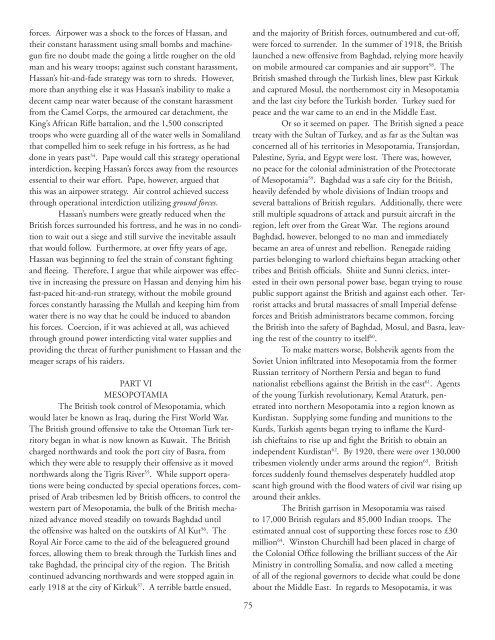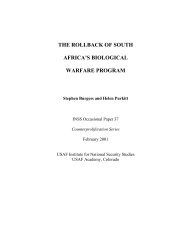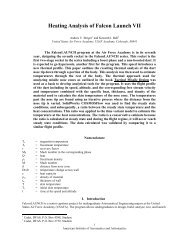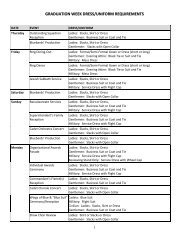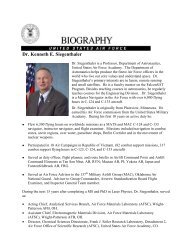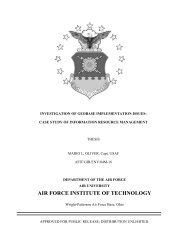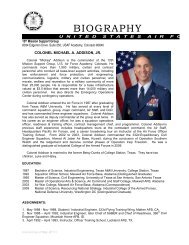Airman Scholar Sp05-1.indd - United States Air Force Academy
Airman Scholar Sp05-1.indd - United States Air Force Academy
Airman Scholar Sp05-1.indd - United States Air Force Academy
Create successful ePaper yourself
Turn your PDF publications into a flip-book with our unique Google optimized e-Paper software.
forces. <strong>Air</strong>power was a shock to the forces of Hassan, and<br />
their constant harassment using small bombs and machinegun<br />
fire no doubt made the going a little rougher on the old<br />
man and his weary troops; against such constant harassment,<br />
Hassan’s hit-and-fade strategy was torn to shreds. However,<br />
more than anything else it was Hassan’s inability to make a<br />
decent camp near water because of the constant harassment<br />
from the Camel Corps, the armoured car detachment, the<br />
King’s African Rifle battalion, and the 1,500 conscripted<br />
troops who were guarding all of the water wells in Somaliland<br />
that compelled him to seek refuge in his fortress, as he had<br />
done in years past 54 . Pape would call this strategy operational<br />
interdiction, keeping Hassan’s forces away from the resources<br />
essential to their war effort. Pape, however, argued that<br />
this was an airpower strategy. <strong>Air</strong> control achieved success<br />
through operational interdiction utilizing ground forces.<br />
Hassan’s numbers were greatly reduced when the<br />
British forces surrounded his fortress, and he was in no condition<br />
to wait out a siege and still survive the inevitable assault<br />
that would follow. Furthermore, at over fifty years of age,<br />
Hassan was beginning to feel the strain of constant fighting<br />
and fleeing. Therefore, I argue that while airpower was effective<br />
in increasing the pressure on Hassan and denying him his<br />
fast-paced hit-and-run strategy, without the mobile ground<br />
forces constantly harassing the Mullah and keeping him from<br />
water there is no way that he could be induced to abandon<br />
his forces. Coercion, if it was achieved at all, was achieved<br />
through ground power interdicting vital water supplies and<br />
providing the threat of further punishment to Hassan and the<br />
meager scraps of his raiders.<br />
PART VI<br />
MESOPOTAMIA<br />
The British took control of Mesopotamia, which<br />
would later be known as Iraq, during the First World War.<br />
The British ground offensive to take the Ottoman Turk territory<br />
began in what is now known as Kuwait. The British<br />
charged northwards and took the port city of Basra, from<br />
which they were able to resupply their offensive as it moved<br />
northwards along the Tigris River 55 . While support operations<br />
were being conducted by special operations forces, comprised<br />
of Arab tribesmen led by British officers, to control the<br />
western part of Mesopotamia, the bulk of the British mechanized<br />
advance moved steadily on towards Baghdad until<br />
the offensive was halted on the outskirts of Al Kut 56 . The<br />
Royal <strong>Air</strong> <strong>Force</strong> came to the aid of the beleaguered ground<br />
forces, allowing them to break through the Turkish lines and<br />
take Baghdad, the principal city of the region. The British<br />
continued advancing northwards and were stopped again in<br />
early 1918 at the city of Kirkuk 57 . A terrible battle ensued,<br />
75<br />
and the majority of British forces, outnumbered and cut-off,<br />
were forced to surrender. In the summer of 1918, the British<br />
launched a new offensive from Baghdad, relying more heavily<br />
on mobile armoured car companies and air support 58 . The<br />
British smashed through the Turkish lines, blew past Kirkuk<br />
and captured Mosul, the northernmost city in Mesopotamia<br />
and the last city before the Turkish border. Turkey sued for<br />
peace and the war came to an end in the Middle East.<br />
Or so it seemed on paper. The British signed a peace<br />
treaty with the Sultan of Turkey, and as far as the Sultan was<br />
concerned all of his territories in Mesopotamia, Transjordan,<br />
Palestine, Syria, and Egypt were lost. There was, however,<br />
no peace for the colonial administration of the Protectorate<br />
of Mesopotamia 59 . Baghdad was a safe city for the British,<br />
heavily defended by whole divisions of Indian troops and<br />
several battalions of British regulars. Additionally, there were<br />
still multiple squadrons of attack and pursuit aircraft in the<br />
region, left over from the Great War. The regions around<br />
Baghdad, however, belonged to no man and immediately<br />
became an area of unrest and rebellion. Renegade raiding<br />
parties belonging to warlord chieftains began attacking other<br />
tribes and British officials. Shiite and Sunni clerics, interested<br />
in their own personal power base, began trying to rouse<br />
public support against the British and against each other. Terrorist<br />
attacks and brutal massacres of small Imperial defense<br />
forces and British administrators became common, forcing<br />
the British into the safety of Baghdad, Mosul, and Basra, leaving<br />
the rest of the country to itself 60 .<br />
To make matters worse, Bolshevik agents from the<br />
Soviet Union infiltrated into Mesopotamia from the former<br />
Russian territory of Northern Persia and began to fund<br />
nationalist rebellions against the British in the east 61 . Agents<br />
of the young Turkish revolutionary, Kemal Ataturk, penetrated<br />
into northern Mesopotamia into a region known as<br />
Kurdistan. Supplying some funding and munitions to the<br />
Kurds, Turkish agents began trying to inflame the Kurdish<br />
chieftains to rise up and fight the British to obtain an<br />
independent Kurdistan 62 . By 1920, there were over 130,000<br />
tribesmen violently under arms around the region 63 . British<br />
forces suddenly found themselves desperately huddled atop<br />
scant high ground with the flood waters of civil war rising up<br />
around their ankles.<br />
The British garrison in Mesopotamia was raised<br />
to 17,000 British regulars and 85,000 Indian troops. The<br />
estimated annual cost of supporting these forces rose to £30<br />
million 64 . Winston Churchill had been placed in charge of<br />
the Colonial Office following the brilliant success of the <strong>Air</strong><br />
Ministry in controlling Somalia, and now called a meeting<br />
of all of the regional governors to decide what could be done<br />
about the Middle East. In regards to Mesopotamia, it was


